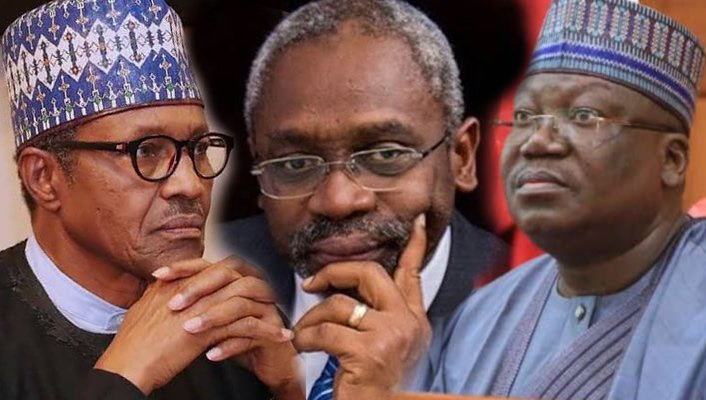
LEKE BAIYEWU examines how the National Assembly succumbed to external forces, making the parliament to backtrack from its initial move to override the President, Major General Muhammadu Buhari’s (retd.) on the Electoral Act (Amendment) Bill
Since the 9th National Assembly was inaugurated on June 11, 2019, the federal parliament has been repeatedly criticised as a rubber stamp of the Presidency cum Executive arm of the Federal Government. Despite the barrage of criticisms that keep following its actions and inaction on issues concerning public policies and programmes, the lawmakers, collectively and individually, often claim that the National Assembly is an independent arm of government.
However, the case of the Electoral Act (Amendment) Bill seems to be a classic case of how the National Assembly keeps barking but fail to bite.
The President, Major General Muhammadu Buhari (retd.), had vetoed the electoral bill and sent it back to the National Assembly over the restriction of political parties to direct primary, insisting on the direct, indirect or consensus means so that political parties would be able to make a choice of the mode of primary to engage in choosing their candidates for elective public offices.
While Nigerians were waiting on the President to sign the bill into law, within the 30-day window prescribed by the Constitution, failure which the National Assembly is empowered to veto the legislation, the Chairman of the House Committee on Media and Public Affairs, Benjamin Kalu (APC/Abia), while briefing journalists at the House on December 9, 2021, justified the decision by the National Assembly to restrict political parties to only direct primary in selection of candidates for elective public offices. Reacting to a question on the possibility of Buhari rejecting the bill, Kalu had said, “I am hoping that by the grace of God, we will be able to make Mr President toe our own line.”
During the waiting period, state governors, especially those on the platform of the ruling All Progressives Congress, were said to have mounted pressure on the president not to sign the new bill. Analysts had noted that the lawmakers imposed direct primary on parties to shield themselves from the overbearing influence and godfather posture of the governors.
On December 21, 2021, the Senate President, Ahmad Lawan; and Speaker of House of Representatives, Femi Gbajabiamila, read the communication from Buhari on his decision to withhold assent to the electoral bill. The letter, which was dated December 13, 2021, was received by the House on December 21, 2021. It was titled, ‘Withholding of Assent to Electoral Act Amendment Bill 2021.’ While Gbajabiamila said the House would suspend action till after Christmas and New Year break, Lawan had called for the suspension of the matter till the next day to allow consultations with the House.
That day, there were protests at the Senate, with several members especially from the minority/opposition camp vowing that the chamber would veto the President the next day.
For instance, Senator George Sekibo (PDP/Rivers), who told journalists that the Senate adjourned plenary till the next day to enable the lawmakers to override the President, had stated, “By law, we have the power to override him; that is what section 58 (4) and (5) said. We will use our powers to do it. And they are saying that people must be present to vote. Our rule gives us three methods of voting: voice vote, by signing the document (signature) and electronic voting. So, we can use anyone. We have collected signatures in the chamber and it cuts across party lines.”
Similarly, Senator Matthew Urhoghide (PDP/Edo) said the National Assembly must prove that it is not a rubber stamp parliament by going ahead to override the President the next day. He partly said, “We must be reminded that members of the National Assembly are truly the representatives of the people because every federal constituency and senatorial district seat is allocated to a segment of the Nigerian people who are their constituents. The members of the National Assembly consulted with a cross-section of their constituents to reach an informed position on any matter of national interest and development.”
In the same vein, Senator Abba Moro (PDP/Benue) had said, “The reasons given by the President to withhold assent, to my view and the views of the majority of senators, are not enough. This is because all stakeholders have acknowledged the fact that the amended Electoral Act, as it is today, contains fantastic provisions that could deepen democracy. If we reject the electoral bill because of direct primary, then it will be very unfortunate. If it’s because of direct primary that the President rejected the will of the people, I can assure you that my colleagues and I are prepared this time around to override the President.”
While all eyes were on the Senate to initiate the move against Buhari on the bill the next day, it was an anti-climax as Lawan called for further suspension of the matter till 2022 during which he said the chamber would have liaised with the House, and the lawmakers would have consulted with their constituents.
However, the Peoples Democratic Party caucus in the House, same day, vowed to mobilise lawmakers in order to have enough votes to override the President on the bill.
Leader of the caucus, Kingsley Chinda, made fresh threats in a statement issued on December 22, 2021, titled ‘Save Nigeria now from Buhari: PDP Caucus lawmakers cry out…Say Nigeria seized by hostage takers, bandits, terrorists…as Mr President shows utter disdain for Constitution…calls on Buhari to resign.’ The statement partly read, “On the issue of the Electoral Act Amendment Bill, the caucus expressed concerns that in the past one month, Nigerians have waited on General Buhari to give assent to the electoral reform bill passed to him by the National Assembly. As an opposition caucus, we will ensure that our members exercise their power under Section 58(5) of the Constitution to override the President whenever the National Assembly deems it fit to table the issue for discussion.”
After all the protests, threats and noises, close watchers of the developments in the National Assembly were shocked when both chambers of the parliament returned from recess on January 18, 2022, and made a U-turn on the move to override Buhari’s veto. It was announced that the leadership of the National Assembly had resolved to rework the bill and send it back to the President for assent.
Gbajabiamila had specifically said the electoral bill, from which the President withdrew his assent, would be reworked and passed the next day, and subsequently resent to Buhari. “I remain convinced that the proposal for direct primary elections is valuable for building accountability in our political system. But we must not allow the perfect to be the enemy of the good,” he said
At the Senate, Lawan also said the chamber would “look into the issue,” saying again that the senators would consult the House on the matter.
On the D-day, the House amended Clause Section 87 of the Electoral Act 2010, which is Clause 84 of the electoral bill, by inserting the indirect primary option. However, the Senate not only added indirect primary but also consensus adoption of candidates for elections by a political party, a development that drew condemnation from a section of the public.
The House’ spokesman had, however, stated that Buhari was specific about the amendments he sought from the National Assembly, which was having the direct and indirect options, and that the chamber could not go beyond the amendments sought by the President based on its rule.
When asked why the lawmakers chose to amend the bill and not override the President’s veto as promised, Kalu noted that though the lawmakers have veto powers, they needed the required numbers (two-thirds) to make the move. “If you don’t secure that and the executive session says ‘we don’t want to drag this anymore, time is of the essence; let’s keep moving,’ it is in the interest of the advancement of our democracy. It is not an ego war; it is not like anybody is trying to prove anything,” he had said.
Kalu added, “On the issue of consensus, I refer you to the wordings in the letter of Mr President, which specifically mentioned direct and indirect primaries. In his words, Mr President, in that letter, which is a formal communication to us, requested in his formal communication to give the option of direct and indirect primaries. And the House, in the spirit of nation-building, has accepted to move ahead.”
While the National Assembly, on Monday, transmitted the reworked bill to the President for assent, a member of the House, Dachung Bagos (PDP/Plateau State), who noted that the National Assembly would have overridden Buhari’s veto, expressed doubt that the President would assent to the reworked bill.
Bagos said, “Overriding the President will be an act of concern, so that a baby will not be thrown away with the bathwater. How are we now sure that if those areas that the President has concerns about are removed, he will sign the bill? Again, do we have the time to go through that again and send it back? There are a lot of issues and discussions around that. That is why I am telling you that we can have more than two-thirds because of the concerns that we have in certain areas in the electoral bill.
“Getting the two-third is not just about overriding the President on the premise of the direct or indirect primary, getting the two-third will be out of fear that, ‘let this not be that the executive, again, will throw away everything that has to do with the electoral bill.’ But then, if the assurance of amending (the bill) and taking it back, and the President assents (to it), that will be a different thing. But it is now going to be a major concern that if we now amend these grey areas, send it back to the President and he does not sign it again but raises another issue, then, there is something behind it.”
The lawmaker expressed fears over a recurrent of the fate that befell the electoral bill under the 8th Assembly where the lawmakers reworked the legislation three times and the President declined assent three times.
He partly added, “Definitely, in the 9th Assembly, especially from the minority caucus, we are not going to allow that to happen again. I remember that at a certain point, the bill was sent back because of typographical error and at the end of the day, it was not signed (into law) because there was no time and should it become law, it would be out of the law for the Independent National Electoral Commission to use it. That is why we want to work fast.”
Speaking on the new turn of events, the Chairman, House Committee on Media and Public Affairs, Benjamin Kalu (APC/Abia), noted that the lawmakers considered various factors before reaching the compromise. He partly said, “We noticed that the Senate added consensus to that particular clause which was not part of what was communicated by Mr President in the letter that was forwarded to us. Having seen that, the House, in its wisdom, looked at those things that were capable of delaying assent by Mr President; those things that could affect the timely transmission of the document from the parliament to the President.
“We are not doing anybody’s bidding. There is no gun (placed) on our head. We are partners in nation-building. The mantra of this House has always been ‘Nation-Building: A Joint Task.’ It means partnership; it means synergy. If there is a good idea coming from the legislative arm and it is impressed by the executive arm, and it helps to build our nation, that is what we are concerned about. It is the same thing with the President or the executive having good ideas that will help to advance our democracy. But in it all, what we have done has been consultation; we have been consulting with Nigerians and as you know, they are the ones who gave us their mandate to be here. And if Nigerians are saying ‘give us the full options,’ we have to give them the full options. This is what Nigerians want and I think Nigerians should be happy that these options have not been given; they are not blanket options, they are options with conditions; and these conditions are conditions that will tailor the options to the ethos of democracy. And that is most important in this whole scenario.”
Speaking on the possibility of Buhari withholding assent to the bill the second time based on the extended amendments, Kalu said, “I will not pre-empt Mr President. We can only do our part as legislators and pass the ball back to their court; what they do with it is up to them within the provisions of our law. What we are asking now; what is important is whether we have acted within the parameters of the law and the mandate of the people, and the answer is yes.”
Speaking on the matter, the spokesman for the Pan Niger Delta Forum, Ken Robinson, said though the National Assembly members had shown that it had no moral fibre to override the President on the contentious withholding of assent to the electoral bill, it was a good thing that the lawmakers allowed reason to prevail by re-amending the bill before transmitting it to Buhari for the second time.
Robinson said, “We have asserted that this National Assembly does not have the temerity to override Mr President; we have made it clear that they do not have the guts to override Mr President. But beyond that, the issue of direct primary was an issue that a lot of people within and outside the political spectrum were not comfortable with. You don’t have to restrict political parties to how they will conduct their primaries; that was unnecessary and that was made clear by us. The inclusion of that clause by the National Assembly was unnecessary.
“They should have left the system open; it is either direct, indirect or consensus. It is natural that people will agree and disagree and at some point, agree. But when you restrict them to just one option, it calls for chaos. In that regard, it is proper that they listen not only to the desire of the President, but also some other political stakeholders and even citizens who are patriotic and concerned about that particular clause.
“To that extent, perhaps, it is good that they (National Assembly) didn’t override Mr President; it is good that they allowed reason to prevail and included the various options that political parties could use. On this matter, we may pardon the federal lawmakers even if they are rubber stamp.”
Copyright PUNCH.
All rights reserved. This material, and other digital content on this website, may not be reproduced, published, broadcast, rewritten or redistributed in whole or in part without prior express written permission from PUNCH.
Contact: [email protected]





